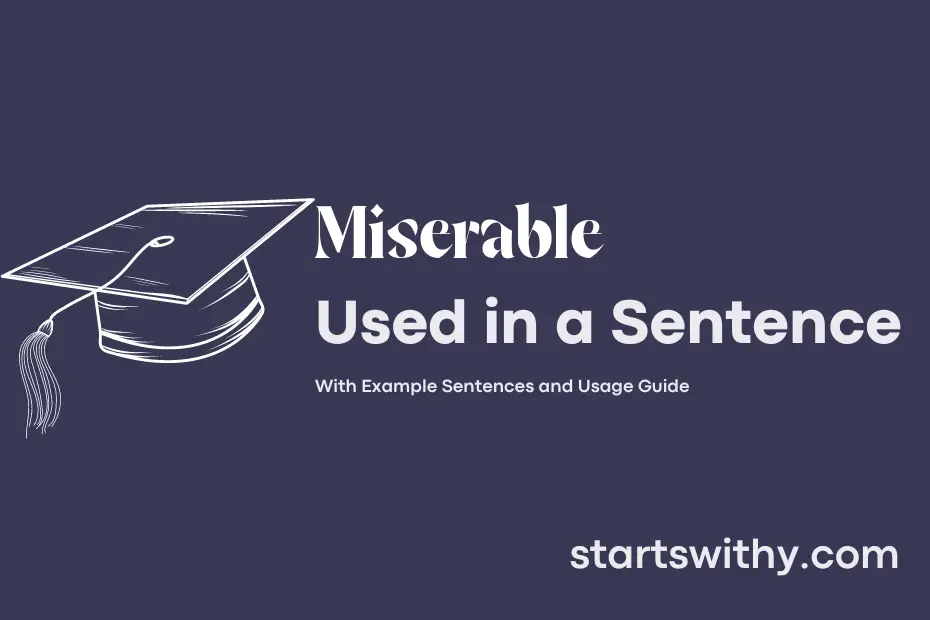Have you ever wondered how to convey a feeling of extreme unhappiness and discomfort in just a few words? This is where the term “miserable” comes into play.
“Miserable” is an adjective used to describe a state of deep unhappiness, suffering, or discomfort. It typically refers to a feeling of great distress, sadness, or discomfort that can be caused by various factors such as unfortunate circumstances, physical pain, or emotional distress.
7 Examples Of Miserable Used In a Sentence For Kids
- The little kitten looked miserable in the rain.
- The sad puppy felt miserable without its toy.
- The boy felt miserable when he lost his favorite pencil.
- The girl felt miserable when she couldn’t find her teddy bear.
- The frog looked miserable with its wet feet.
- The plant looked miserable without water.
- The butterfly felt miserable when its wings got torn.

14 Sentences with Miserable Examples
- Miserable accommodation conditions can be a common struggle for many college students in India.
- Waking up early for classes after a late night of studying can make students feel miserable.
- Long lectures on boring subjects can make the entire classroom feel miserable.
- Miserable food options in the college canteen can leave students feeling unsatisfied and hungry.
- Group projects with uncooperative team members can lead to a miserable experience.
- Not being able to afford basic necessities can make students feel miserable.
- Falling behind in coursework and feeling overwhelmed with assignments can make students feel miserable.
- An unresponsive internet connection during online exams can make the exam experience miserable.
- Feeling homesick and miserable during festivals when unable to go home to celebrate with family.
- Spending long hours in the library studying for exams can leave students feeling mentally and physically miserable.
- Balancing part-time jobs with studies can lead to miserable levels of exhaustion and stress.
- Not fitting in with peer groups can make students feel miserable and isolated on campus.
- Miserable weather conditions during exam season can make it hard for students to focus and concentrate on their studies.
- Not being able to afford extracurricular activities or outings with friends can make students feel miserable and left out.

How To Use Miserable in Sentences?
To Miserable is to feel extremely unhappy or uncomfortable. When using this word in a sentence, it is important to convey a strong sense of distress or sorrow.
Here are some tips on how to use Miserable effectively in a sentence:
- Context: Make sure the context of the sentence conveys the feeling of deep unhappiness or discomfort. This can be achieved by describing a situation or emotion that evokes such a response.
Example: “After losing his job, he felt miserable and lost.”
- Adjectives: Pairing Miserable with strong adjectives can enhance the impact of the sentence. Choose words that emphasize the intensity of the feeling being described.
Example: “She was utterly miserable after the breakup.”

- Expressions: Using expressions or metaphors can help paint a vivid picture of the feeling of being Miserable. This can make the sentence more engaging and relatable.
Example: “The dark clouds overhead matched his miserable mood.”
- Body Language: Consider incorporating body language or actions into the sentence to show how the person is feeling Miserable. This adds depth to the description and helps readers empathize with the emotion.
Example: “She sat hunched over, tears streaming down her face, looking utterly miserable.”
By following these tips, you can effectively incorporate the word Miserable into your sentences to accurately convey feelings of deep unhappiness or discomfort.
Conclusion
In conclusion, the examples of sentences with the keyword “miserable” illustrate feelings of unhappiness, wretchedness, and discomfort. From describing a terrible living situation to expressing intense emotional suffering, the word “miserable” serves to convey the depth of despair and misery in various contexts. Whether used to depict physical discomfort or emotional torment, this word encapsulates the grim and distressing experiences that individuals may endure.
Ultimately, sentences featuring the word “miserable” provide insight into the harsh realities of human suffering and emphasize the profound impact that misery can have on individuals. By presenting different scenarios where this word is employed, one can glean a greater understanding of the profound sense of misery that can permeate aspects of life, underscoring the importance of empathy and support in alleviating such distress.



